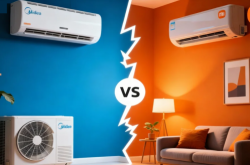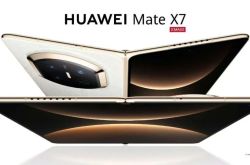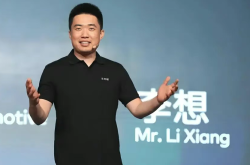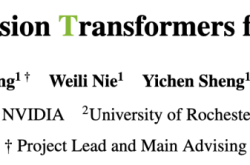Why Did Former Shareholder Midea Turn Hostile Towards Xiaomi Before Gree?
![]() 11/27 2025
11/27 2025
![]() 431
431
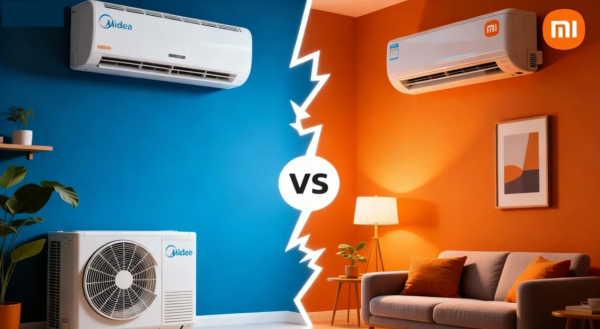
A decade ago, Fang Hongbo and Lei Jun stood side by side, shaking hands and beaming under the glare of the cameras. Little did they imagine that they would one day become fierce competitors.
Today, a news story has sent shockwaves through the home appliance industry. According to a report by Jiemian News, the home appliance behemoth Midea Group has issued a directive to its after-sales service providers, barring them from simultaneously handling business for both Xiaomi and Gree.
In layman's terms, this mandate forces service providers into a tough choice: to earn money from Midea, they must forgo business with Midea's key competitors.
As soon as this news surfaced, Midea's PR department quickly stepped in to 'debunk the rumors,' telling various media outlets, 'The relevant news is false,' and 'The company does not mandate exclusive cooperation with after-sales service providers.'
Gree and Midea have been locked in a fierce rivalry for over a decade, reminiscent of the legendary 'Yu and Liang' feud in the home appliance world. Their clashes are well-known. However, the inclusion of Xiaomi this time, with some insiders suggesting it's the primary target, adds an intriguing twist to the story.
01
From Allies to Rivals
Xiaomi Air Conditioner: 'The Wolf Has Arrived'
Let's rewind to the end of 2014.
That year, Lei Jun's 'Flying Pig in the Wind' theory swept the nation. Xiaomi's smartphones were at their zenith, and the company was aggressively expanding its 'IoT (Internet of Things) Ecosystem Empire.' Meanwhile, Midea, a traditional home appliance giant, was grappling with 'Internet anxiety' and urgently seeking a gateway to the new digital frontier.
One had traffic and an ecosystem, while the other possessed manufacturing prowess and a supply chain. It was a match made in heaven.
In December 2014, Midea Group and Xiaomi Technology proudly announced a strategic partnership. The crux of this alliance was a substantial financial 'marriage': Midea Group issued 55 million private placement shares (directed additional shares) to Xiaomi Technology, raising a total of nearly 1.266 billion yuan. Following the transaction, Xiaomi Technology held a 1.29% stake in Midea Group and secured a board nomination right.
The announcement of this partnership was penned in a highly romantic tone, with both sides vowing to collaborate deeply in areas such as the smart home industry chain, e-commerce, and investment, adhering to the principles of 'openness, sharing, and integration.'
In 2015, the two sides entered a 'honeymoon period.' Fang Hongbo, Chairman of Midea, and Lei Jun frequently appeared together, jointly launching products like the i-Youth Smart Air Conditioner. At that time, everyone believed that the 'Midea-Xiaomi Era' in the home appliance industry was on the horizon.
However, honeymoons in the business world are fleeting. This partnership seemed more like 'sleeping in the same bed but dreaming different dreams.'
Midea hoped that Xiaomi would leverage its Internet channels to boost sales of Midea's smart home appliances. Xiaomi, on the other hand, aimed to tap into Midea's robust supply chain and manufacturing capabilities to swiftly fill the largest gap in its ecosystem: 'major home appliances.'
But the issue was that neither side wanted to become a subordinate of the other.
Midea launched the M-Smart open platform, partnering not only with Xiaomi but also with Alibaba, Huawei, and adopting a 'wide-net' strategy to avoid being tethered to Xiaomi's ecosystem. Xiaomi, after gaining insights into the home appliance industry, realized that instead of making wedding dresses for others, it would be better to step into the arena itself.
The turning point came in 2018. That year, Xiaomi launched its first self-branded air conditioner. Also that year, the three-year lock-up period for the shares Midea issued to Xiaomi officially expired.
The script from 'teammates' to 'rivals' began to unfold.
Starting in 2019, Xiaomi quietly began reducing its stake in Midea and soon vanished from the list of top ten shareholders. Midea, not to be outdone, also sold its Xiaomi shares on the secondary market.
This once high-profile 'century marriage' ultimately ended in solitude, with both sides 'mutually liquidating' their holdings.
02
Xiaomi's Meteoric Rise
A 'Thorn' in Midea's Side
If the capital breakup between the two sides was somewhat amicable, then Xiaomi's meteoric rise in the air conditioning business has completely ignited Midea's 'killing intent.'
Air conditioners are Midea Group's core and most profitable business, its 'birthplace of prosperity.' Xiaomi, however, has chosen this very area as the focal point of its major home appliance strategy.
When Xiaomi air conditioners first entered the market in 2018, they were still 'newbies' with sluggish sales and were dismissed as 'dabblers' by traditional giants.
But no one anticipated that Xiaomi would unhesitatingly apply its tried-and-true tactics from the smartphone industry—'extreme cost-effectiveness + online channels + smart ecosystem'—to the air conditioning market, with remarkable success.
In 2023, Xiaomi's air conditioner shipments reached 4.4 million units, a staggering 49% increase. In 2024, shipments are expected to exceed 6 million units, maintaining a 50% high growth rate, with its online market share firmly ranked among the top three in the industry.
By July 2025, data from Aowei Cloud Network revealed that Xiaomi's online market share for air conditioners temporarily surpassed Gree's, becoming the second-largest brand after Midea.
What does this signify? It means that in the fiercely contested online market, Xiaomi has evolved from a 'disruptor' to a 'challenger' capable of directly threatening Midea's dominant position.
What makes Midea even more uneasy is that Xiaomi is not content with just being a 'contract manufacturer.' It is aggressively catching up. In recent years, Xiaomi has heavily invested in self-research and self-production, establishing major home appliance R&D centers and production bases in Beijing, Wuhan, and other locations, attempting to transition from a 'light asset' Internet model to a 'heavy asset' 'deep manufacturing' model.
For Midea, Gree is an old rival they have been battling for over a decade. Both sides are well-versed in each other's strategies and strengths. Gree's strength lies offline, while Midea's advantage is in balance. They are like two martial arts masters, engaging in intense battles but still adhering to the same martial arts rules.
Xiaomi, however, is an 'interdimensional visitor' who doesn't play by the rules. It uses Internet logic to directly bypass the 'channel king' game rules that traditional home appliance industries rely on for survival. Every air conditioner it sells online means one less customer for Midea or Gree.
This thorn has deeply pierced Midea's most vulnerable side.
Understanding Xiaomi's threat, when we examine Midea's rumored 'ban order' this time, we can see its ingenuity and ruthlessness. Why specifically target 'after-sales service providers?'
In the home appliance industry, especially for products like air conditioners that require professional installation, the adage '30% depends on the product, 70% depends on the installation' rings true. A brand's reputation is largely determined by installation and after-sales service.
Traditional home appliance giants like Midea and Gree all possess extensive and mature nationwide after-sales service networks. This system is a moat they have spent decades building with substantial investment. Xiaomi, as a latecomer, has exactly this as its biggest weakness in its offline channels and service networks.
In the past, to quickly make up for this weakness, Xiaomi often chose to collaborate with local mature third-party service providers that served multiple brands. Among these, a large number of service providers were also partners of Midea or Gree. They were experienced and widely covered, playing a crucial role in enabling Xiaomi air conditioners to 'land.'
Now, Midea's 'choose one of three' policy aims to precisely cut off Xiaomi's 'leg.'
For these after-sales service providers, this is a difficult choice. On one side is Midea, a 'major sponsor' with a huge business volume and years of cooperation. On the other side is Xiaomi, a rapidly growing and potentially unlimited 'new aristocrat.' But when push comes to shove, in the face of Midea's strong channel control and business volume, most service providers probably have no choice but to side with Midea.
Once these experienced service providers stop accepting Xiaomi's orders, Xiaomi must find or build its own service team from scratch. This not only requires significant time and financial costs but will also severely impact its installation efficiency and user experience in the short term, thereby curbing its fierce growth momentum.
This move can be described as 'cutting off the supply.' It is not a price war or a marketing war but a 'channel control war' that traditional home appliance companies excel at and Internet companies are weakest in.
03
The World of Business Is Not Just About Fighting
It's About Human Connections
Returning to our initial question: Why did Midea turn hostile towards Xiaomi before Gree?
It can be summarized in three aspects: First, direct conflict of interest: The rise of Xiaomi air conditioners directly encroaches on Midea's core business. In comparison, Gree has faced setbacks in its channel reforms in recent years and is already weak online. Xiaomi's impact, while affecting it, is felt more directly and painfully by Midea.
Second, the 'betrayal' of a former ally: Midea once regarded Xiaomi as a 'business partner' for its intelligent transformation and even showed goodwill by offering a significant stake. The result was that the other party learned from them, established its own business, and even snatched Midea's business. This sense of 'betrayal' and alertness from the transition from ally to rival is far stronger than facing an old rival like Gree.
Third, the clash of strategic approaches: Midea has been pushing for channel reforms in recent years, emphasizing DTC (Direct-to-Consumer) and efficiency improvements. Xiaomi's Internet direct sales model is precisely the ultimate form of DTC. Strategically, the two sides have already collided head-on. Midea must launch a preemptive strike before Xiaomi's offline service network takes shape.
This channel war, on the surface, is about forcing after-sales service providers to choose sides, but in reality, it reflects the identity anxiety of the home appliance industry during its transition to Internetization. Midea and others must defend their offline moats while fearing being disrupted by online newcomers. In the end, they can only resort to the most crude method of 'either-or.'
But history tells us that no company can survive until the next 'checkpoint' solely through blockade. When consumers are already accustomed to buying air conditioners in live streams and when IoT ecosystems determine purchasing decisions, Midea's 'chain-breaking' move may win a few battles but may not determine the outcome of the war.


